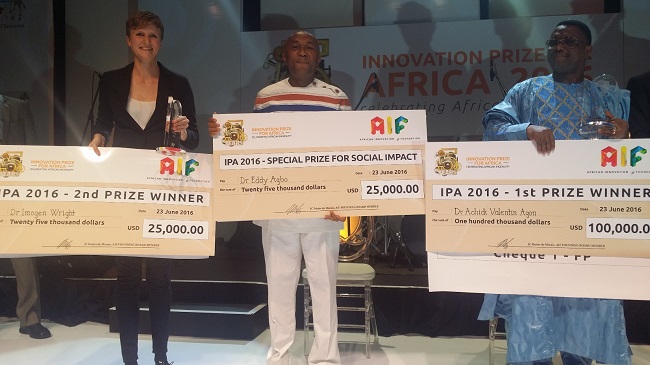Innovation Prize for Africa awarded

In a glittering ceremony that marked the five-year milestone anniversary of the Innovation Prize for Africa the landmark programme of the African Innovation Foundation (AIF) innovative healthcare solutions took pole position this year, offering ground-breaking responses to address Africa’s prevailing malaria and HIV/AIDS burdens.
Out of a total of 985 applications, 10 nominees were selected, and from these Dr Valentin Agon of Benin was selected overall winner, with Imogen Wright of South Africa scooping Second Prize, and Dr Eddy Agbo of Nigeria winning the Special Prize for Social impact.
Disease, especially in Africa, is a preventable cause of poverty, but remains a pressing problem in the continent. A 2015 World Bank report states that an overwhelming 99% of people who die from AIDS, malaria, and tuberculosis (TB) live in the developing world.
The epicentre of the HIV and AIDs epidemic is sub-Saharan Africa, home to 70% of all new HIV infections. Malaria kills about 660 000 people each year, negatively impacting on African economies and households. Economists believe that malaria is responsible for a growth penalty of up to 1.3% in some African countries, hindering economic growth in the region.
AIF partnered with the Government of Botswana represented by the Ministry of Infrastructure, Science and Technology (MIST) and the Botswana Innovation Hub (BIH) to host IPA 2016 under its theme Made in Africa.
Botswana President Lieutenant General Seretse Khama Ian Khama presided at the prestigious awards ceremony, held at the Gaborone International Conference Centre (GICC) in the capital’s metropolis.
“IPA 2016 marks some historic achievements since its inception in 2011,” said Jean Claude Bastos de Morais, AIF Founding Board Member. “Besides a huge database of more than 6 000 innovators for increased share and exchange of information and a cash investment of US$1 million, we received endorsement from the United Nations Economic Commission for Africa (UNECA) in support of innovation-led strategies to boost national development.”
He added: “We are proud of the overwhelming response we have received for the competition thus far and congratulate all 10 nominees and the winners.”
IPA winners this year demonstrated know how and expertise, boasting dynamic new inroads to address the malaria and HIV disease burdens confronting Africa. The winning innovations this year impressed the expert panel of judges, led by Amolo Ng’Weno: “The standards were very high, and it was difficult to make a decision; everyone is a winner and all of them were addressing major social issues. I congratulate the winners and look forward to the next five years of IPA”.
Dr Valentin Agon of Benin was unanimous winner of the US$100 000 Grand Prize for his innovation Api-Palu, an anti-malaria drug treatment that has hit the market not only in Benin, but in Burkina Faso, Tchad, and Central African Republic (CAR). Made from natural plant extract, Api-Palu is significantly cheaper than anti-malarial drugs currently on the market; it has great inhibitory effects on 3D7 strains of plasmodium falciparum the causative agent of malaria.
Dr. Imogen Wright of South Africa scooped the Second Prize of US$25 000 for Exatype, a software solution that enables healthcare workers to determine HIV positive patients’ responsiveness to ARV drug treatment.
Until now, national responses have focussed on access to treatment for all. However, a growing number of people on ARVs are resistant to drug regimens, leading to failure of the therapy, exacerbating the continent’s HIV burden. Exatype processes the highly complex data produced by advanced “next-generation” DNA sequencing of the HIV DNA in a patient’s blood. Through a simple report, it detects drugs that are resistant to the patient, then highlights the need to avoid these to ensure successful treatment.
The Social Impact Prize of US$25 000 was awarded to Dr Eddy Agbo of Nigeria for his Urine Test for Malaria (UMT) a rapid non-blood diagnostic medical device that can diagnose malaria in less than 25 minutes.
More often than not, when fever is detected, anti-malaria medication is administered. However, not all fevers are due to malaria. Also, the inability to quickly diagnose and commence malaria treatment can lead to various complications including kidney failure, build-up of lung fluid, aplastic anaemia and even death. UMT detects malaria parasite proteins in the patient’s urine with fever due to malaria; it is simple and affordable, and a potential game changer in managing malaria and saving lives across Africa.
“All those involved in the advancement of the frontiers of innovation, science, and technology are winners, and on behalf of the Government of Botswana, we would like to congratulate all those who participated in IPA 2016. However, in this pool of achievers, there are those that stand head and shoulders above the rest and we applaud the winners of IPA 2016. We celebrate this fine achievement and trust that it will inspire innovators in Botswana and across the continent to do more to solve Africa’s challenges,” says Alan Boshwaen, CEO of BIH.
This years’ IPA 10 nominees showcased innovations from diverse African countries, reflecting the truly pan African flavour of the IPA initiative. African ingenuity included agricultural solutions, technological software development, power energy initiatives and ground-breaking health care innovations.
AIF, driver of the IPA initiative also hosted a successful Innovation Ecosystems Connector in the new BIH Icon Building space that offered tailor-made workshops and great networking opportunities for both innovators and innovation enablers.
An innovation village showcased a variety of exhibitions from Botswana and the rest of Africa, with maker spaces, African food and fashion.
The IPA 2016 Awards Ceremony was presented by CNBC’s Nozipho Mbanjwa; South Africa’s Freshly Ground provided spectacular entertainment, as more than 400 movers and shakers celebrated five years of Made in Africa, donning the colours of Africa.
African Press Organization

